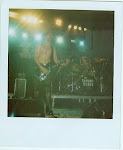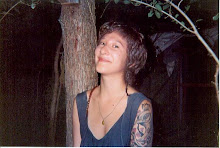 She plays mainly piano, and her style is very classical and beautiful with lovely lyrics.
She plays mainly piano, and her style is very classical and beautiful with lovely lyrics."We’re distracted, our attention is shot, we are under surveillance, and we don’t care! We like being linked and friended by strangers who may or may not be who they say they are. It is so easy to Google everything, highlight and paste any vaguely intelligible sentences into our research, copy and paste the Web address, and call it a citation from a reliable source. Easier still, purchase the whole essay! Or make shit up. Who cares?
Freedom of speech. Democratic rule. Power to the people. Wisdom of the crowd. Cult of the amateur.
Have you walked down the street lately? Does anyone even go outdoors, or are we all online? [Like now.] How dangerous is driving or walking city streets when most every person is under headphones and/or head down pushing at keypads? Pedestrians and drivers pay no attention as they careen around corners or jump into crosswalks, music blasting in their earbuds, tapping a text to someone in another time zone. Mindfulness practice teaches that this habit of always being elsewhere than wherever we are is counter to the primary goal, the path to enlightenment: be present, be here.
But do we need another tirade against the way technology is taking over our minds, brains, and time?
To survive the techno-future perhaps it is better to model ourselves on college students and little kids, who approach the world head-on and greet new ways-of-being with excitement rather than trepidation. Better to embrace new devices and thrive on the vast unwieldy Web. Text grows smaller as the opposable thumb grows agile and large, enabling us to type messages on teeny keypads while driving, while eating, while looking you in the eye, talking, thinking about something else entirely.
Not everyone will agree with the premise of Andrew Keen’s book, The Cult of the Amateur: How Blogs, MySpace, YouTube, and the Rest of Today’s User-generated Media Are Destroying Our Economy, Our Culture, and Our Values, recently out in paperback. Are you a throwback if you do? Are you a cultist if you don’t? Which is worse?
Don’t take the scary tone personally, Amateurs. Keen means all of us, and even he knows there is no going back. In the words of the olden days: The horse is out of the barn. We are living in the New Wild West, “in the midst of the greatest paradigm shift in information and communications history,” according to Christopher M. Schroeder, former CEO and publisher of Washingtonpost.Newsweek Interactive.
Keen has been called a Luddite by techno-utopians everywhere, “The Anti-Christ of Silicon Valley” by the French newspaper Liberación, and an elitist by Internet critic John Colbert. With no gatekeepers, no standard-bearers, no editors, no fact-checkers, Keen says we’re out on a flimsy limb: on the Net without a net. “In the ideology of the collective Wikipedia experiment, the voice of a high school kid has equal value to that of an Ivy League scholar or a trained professional.”
Upper division students in my Writing for Artists class at
Why be afraid? It has always been a jungle out there. We trust ourselves to find our way. We don’t need no stinkin’ gatekeepers. Havana Davidson asks, “Who decides our standards? Talk about Big Brother!” Grant Squires seconds her skepticism: “We are constantly bombarded with corporate opinion in the form of ads in the real world.”
How apt is the Big Brother reference? Keen takes the reader behind the computer screen and shows us all the algorithms briskly sweeping our data, trailing behind us as we surf, pause, purchase, subscribe, connect. Invisible machinery compiles our buying habits, our lusts, our interests, and sends us, in return, links to anything we could possibly want, and so so much that we don’t. But isn’t this just the new dawn of old advertising methods like Nielsen ratings and focus groups? Isn’t it all for us, to cater to us?
“Search engines like Google know more about our habits, our interests, our desires than our friends, our loved ones, and our shrink combined,” says Keen. “But unlike in George Orwell’s 1984, this Big Brother is for real.”
CCA student Noah Brezel agrees, “Google is a little creepy. I use Gmail and the fact that the ads change based on what I’m typing weirds me out. But this is run by a computer program, not a person, and I don’t really care. Nothing that I email about or search for on the Internet is all that interesting or that private.”
In reviewing Jonathan Zittrain’s book The Future of the Internet (and How to Stop It) for The New Republic Online, Tim Wu offers a bit of history. “Both radio and film were, in their early days, much like the Internet is today: new, unreliable, and full of content that was not ready for prime time. These were easy industries to get into, like dot-coms in the 1990s or Web 2.0 in the 2000s.” Zittrain describes how the wild freedom of these media was soon usurped by corporate control. Wu says, “In the early 1920s, AT&T invented the ancestor of what we now know as CBS, Fox, and the rest…. Both NBC on radio and
The issue today isn’t consolidation, Keen argues, but the degradation of expertise. “MySpace and Facebook are creating a youth culture of digital narcissism; open-source knowledge-sharing sites like Wikipedia are undermining the authority of teachers in the classroom; the YouTube generation are more interested in self-expression than in learning about the outside world; the cacophony of anonymous blogs and user-generated content are deafening today’s youth [sic] to the voice of informed experts and professional journalists; today’s kids are so busy self-broadcasting on social networks that they no longer consume the creative work of professional musicians, novelists, or filmmakers.”
Harry Haller, the suicidal bourgeois protagonist of Hermann Hesse’s novel Steppenwolf (set in the 1920s), was in mourning over the state of the world; he hated war and industrialization, and suffered over the coming of radio and what it implied for a cultured man like himself who appreciated the classical pleasures of live music. As with radio, CCA student Kolle Kahle-Riggs understands that YouTube does not represent the end of the civilized world either: “The Baby Boomer generation survived ‘rock and roll music.’ This generation will survive the Internet… Successful artists will transcend the digital world. We can use the Internet as a tool and still succeed in the real world. YouTube is a way to see if we like an artist or not but it is not a replacement for live music. YouTube is not high quality and is obviously not a substitute for the real thing.”
The danger to intellectual property rights is another of Keen’s concerns. “In addition to stealing music or movies, they are stealing articles, photographs, letters, research, videos, jingles, characters, and just about anything else that can be digitized and copied electronically… The digital revolution is creating a generation of cut-and-paste burglars who view all content on the Internet as common property… The widespread acceptance of such behavior threatens to undermine a society that has been built upon hard work, innovation, and the intellectual achievement of our writers, scientists, artists, composers, musicians, journalists, pundits, and moviemakers.” [Editor’s note: I stole every image on this page.]
Appropriation is what we call this in art school. “Have you ever heard the term ‘remix’? This means responding to art by borrowing from it and changing it. It’s legal – or should be!” claims CCA student Daniel McGrath. In this, he agrees with a number of prominent figures, including Lawrence Lessig, who sees “legal sharing” and “re-use” of intellectual property as a social benefit.
“In a twisted kind of
Yes, it is a new paradigm and everyone is excited because we are creating it! CCA student Lain Kay says, “A generation growing up on the Internet sees it as an open and free way to usurp authority, which is often a natural inclination for teens. The Internet allows us to declare ourselves with pretty much no oversight.”
“Every opinion counts, every account should be heard,” says Lauren Scott. “If it is immature or unreliable, the educated and/or intelligent individuals will know… Many times experts cannot see with fresh eyes. Expert or not, everyone is biased and can be accused of promoting a selfish agenda. (It’s called politics.)”
This is our medium! Don’t kill the messenger! It is a tool. We’ll just have to figure out how to control it as we go along—like the wheel, or nuclear power. There is a dark side to everything. The moon. The day.
And there is no going back. Train’s left the station. All aboard! We trust that we will find our way blindly through the maze. Guided by our friends: Hey, check out this musician. Check it out: a lion hugging a man. Instead of being told what to listen to, read, pay for, and do by some anonymous corporate entity, now we listen to each other.
And we talk to each other, we say anything to each other. But should we? There’s a reason why girls’ diaries came with a lock and key: some things are private. “What happens when all our queries and postings and casual comments become open to public consumption, and the Web becomes a permanent repository of the details of our lives?” Keen asks.
To which CCA student Kevin Whiteley says, “I never post my personal life on the Internet. Fools will be fools.”
The Millennials have no fear. They trust themselves. Trust collective wisdom. Facebook visits are like phone calls were in the old days. Or a visit to a neighbor. Instead of sitting on the porch in rockers, we are walking and texting on iPhones, listening to MP3s, being elsewhere and being in touch. There have always been dangers, always will be. We are negotiating new territory. New Pioneers! Brave New Worlders. Evolving. Becoming our machines? Becoming silicon chips? So what? Fine with me! Silicon is part of nature. Cyberspace may appear to be just like the real world but most of us know the difference.
Keen wonders where it goes. “How can we channel the Web 2.0 revolution constructively so that it enriches our economy, culture, and values?”
CCA student Philip Frank answers, “By not taking the Internet so seriously and remembering what remains important to the human spirit and soul of our society: relationships, food, love, joy, sadness, and staying present. Technology may make some things harder but people still have ethics and love.'”
So there you have it. "Turn off Facebook. Turn on LIFE."
Join the Facebook Suicide Brigade and make a difference. Go outside. Read a book. Commit Facebook/Myspace/Twitter Suicide and follow this blog only! That way you can still stay on your precious Internet AND STILL be amazed by the sweet content of this blog. All the cool kids are doing it, so you should do it too.

THINK ABOUT IT.
love, sarahhh

